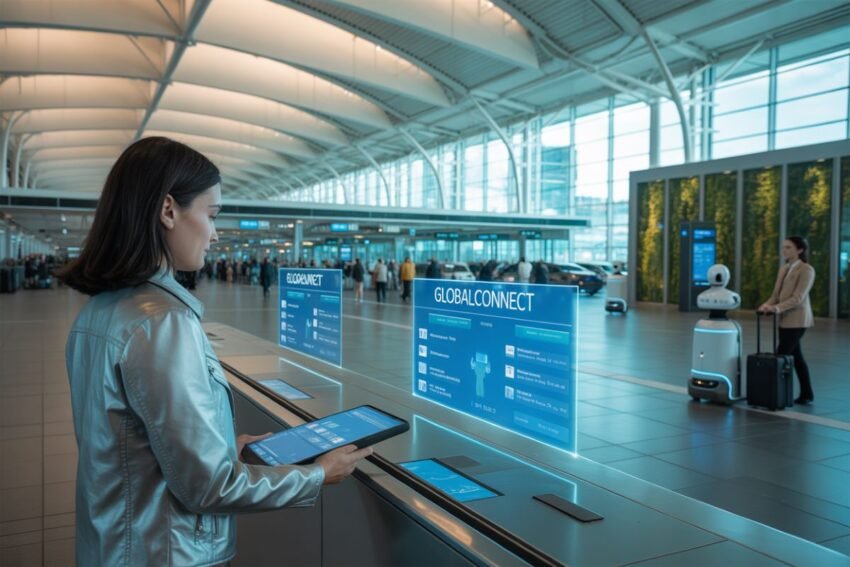By James Panichi ( September 16, 2025, 06:44 GMT | Insight) — Australia intends to regulate artificial intelligence “as much as necessary and as little as possible” in a way that doesn’t hinder the growth of a local AI sector, according to the country’s digital minister. Speaking in Sydney, Digital Economy Minister Andrew Charlton also said that while government policy should support AI development, this needed to be done in a way that protects people from “risks and hazards that are associated with any change of this magnitude.”Australia intends to regulate artificial intelligence “as much as necessary and as little as possible” in a way that doesn’t hinder the growth of a local AI sector, according to the country’s digital minister….
AI Insights
How Artificial Intelligence, Augmented Reality, Virtual Reality And Blockchain Are Transforming The Travel Industry, Find Out Now

Wednesday, August 6, 2025
The entire globe matters in the travel industry due to new advancements in Artificial Intelligence, Augmented Reality, Virtual Reality and blockchain technology passing the boundaries of imagination. AI, AR, and VR technology changes the way people plan their trips, brings new innovations for booking, and enhances the efficiency of the travel industry. Moreover, these technologies add even more value to sustainability efforts. AI systems are even more advanced nowadays and for that reason, travelers get the benefit of much more user-friendly travel plans, including tailored travel schedules and booking and pricing forecasts. Furthermore, AR and VR allow travelers to have advanced previews of the destinations and hotels which makes booking much easier. In addition, blockchain technology continues to advance, travelers are now easier able to manage their expenses and keep track of expenses and reduce their carbon footprint due to transparent systems. In this article, we are going to talk about the technologies which are most commonly implemented in the travel industry which provide more connection and an efficient system in addition to eco-friendliness. We will examine the factors which are most commonly ignored, such as the future of travel.
Customized Travel Planning Powered by AI
Smart Trip Planning Tools: AI-driven tools like Wonderplan and TripGenie are changing how we plan our travels. By analyzing user preferences, past travel data, and real-time information, these tools generate customized itineraries and activity suggestions, ensuring a more personalized experience.
Predictive Pricing Algorithms: AI also plays a significant role in optimizing travel expenses. Predictive pricing tools monitor fluctuations in flight and hotel rates, enabling travelers to book at the most favorable times, thus saving money and ensuring the best deals.
Personalized Marketing for Travelers: AI’s ability to analyze consumer behavior allows for the creation of highly targeted marketing campaigns. By delivering offers and promotions at the right moments, these AI-powered systems make sure travelers receive relevant travel information tailored to their preferences.
Streamlined Airport and Hotel Experiences
Biometric Systems for Faster Travel: Airports are embracing biometric technology, such as facial recognition and fingerprint scanning, to streamline check-ins, security, and boarding. This reduces wait times and improves security, making the airport experience much more efficient.
Digital Check-in and Keyless Room Access: In hotels, contactless check-ins and digital room keys are becoming the norm. Travelers can now check-in via mobile apps and use their smartphones to unlock their hotel rooms, offering a seamless and hygienic experience.
Automated Baggage Handling: With automated baggage drop systems, the process of checking in luggage has become faster and more secure. Biometric verification is being used to ensure that bags are linked to the right passengers, minimizing the risk of lost luggage and fraud.
Immersive Travel Experiences with AR and VR
Interactive Navigation and Virtual Exploration: Augmented and virtual reality technologies are enhancing the travel experience. AR apps are being used to provide interactive maps and advertisements, helping travelers navigate new locations. Meanwhile, VR allows users to explore destinations and hotels virtually before making a booking, providing a better understanding of what to expect.
Interactive Cultural and Historical Tours: Museums and cultural sites are integrating AR and VR to offer immersive and educational experiences. With interactive guides, visitors can learn about history and culture in a more engaging and informative manner, revolutionizing traditional museum visits.
AI-Enhanced Customer Support and Assistance
Instant AI Chat Assistance: AI chatbots, using advanced Natural Language Processing (NLP), are revolutionizing customer support by offering real-time assistance. From answering questions to making booking modifications and processing payments, these AI systems ensure travelers receive prompt service without long wait times.
Automated Travel Issue Resolution: In addition to chatbots, automated customer service systems help resolve issues before they escalate. For example, in case of flight delays or cancellations, these systems can automatically manage rebookings, cancellations, and offer solutions, improving customer satisfaction.
Sustainable Tourism Innovations
Eco-friendly Travel Powered by AI: Artificial Intelligence is helping the travel industry become more eco-conscious by recommending sustainable flight paths, energy-efficient accommodations, and waste-reducing practices for tour operators. These innovations are contributing to more environmentally responsible travel.
Virtual Tourism, A Sustainable Alternative: With the help of AR and VR, virtual tourism allows people to experience destinations without the environmental cost of travel. These technologies provide a way for travelers to visit far-off places without increasing their carbon footprint, making it an eco-friendly option for the future of tourism.
Blockchain for Ethical and Sustainable Travel: Blockchain technology is enhancing transparency in the travel industry, especially regarding sustainability. It allows consumers to track the sustainability practices of travel companies throughout the supply chain, making it easier for them to make environmentally responsible travel choices.
Conclusion
The Travel Sector is changing quickly these days because of technologies like Artificial Intelligence, AR/VR, and Blockchain. Travel is becoming easier to plan, more efficient, and customized to individual needs. These technologies are also enabling smarter sustainable travel options which help travelers make eco-friendly travel choices without sacrificing travel experiences. With the ongoing advancements in these technologies, the travel industry will be transformed for the better and will also help create responsible international tourism.
AI Insights
Indigenous peoples and Artificial Intelligence: Youth perspectives on rights and a liveable future

On August 9, 2025, the world marked the International Day of the World’s Indigenous Peoples under the theme: “Indigenous Peoples and Artificial Intelligence: Defending Rights, Sustaining the Future.” It’s a powerful invitation to ask how emerging tools like AI can empower Indigenous Peoples, rather than marginalise them.
Before we answer how, we need to be clear on who we are talking about and what they face in Cameroon and across the Congo Basin.
Who are Indigenous Peoples in Cameroon?
Cameroon is home to several Indigenous Peoples and communities, including groups often called forest peoples (such as the Baka, Bagyeli, Bedzang) as well as the Mbororo pastoralists and communities commonly referred to as Kirdi. There is no single universal definition of “Indigenous Peoples,” but the UN Declaration on the Rights of Indigenous Peoples (2007) places self-determination at the centre of identification.
The realities: living on the margins
- Land grabbing and loss of forests. Forests are the supermarket, pharmacy, culture and identity of Indigenous communities in the Congo Basin. Yet illegal and abusive logging, land acquisitions and agroforestry projects without proper consultation put their well-being at risk.
- Chiefdoms without recognition. The lack of official recognition of Indigenous chiefdoms weakens participation in decision-making and jeopardises their future.
- No specific national law. Cameroon still lacks a specific legal instrument on Indigenous rights. Reliance on international norms alone doesn’t reflect the local context and leaves gaps in protection.
- Limited access to education and health. Many Indigenous children lack birth certificates, which blocks school enrolment and access to basic services.
I believe the future can be different: one where Indigenous autonomy is respected, traditional knowledge is valued, and well-being is guaranteed.
So where does AI fit in, and what can youth do?
AI isn’t a silver bullet; however, in the hands of informed, organised youth it can accelerate participatory advocacy, surface evidence, and protect community rights.
First, AI-assisted mapping, with consent, can document traditional territories, sacred sites, and resource use, turning them into community-owned evidence for authorities and companies.
Moreover, small AI models can preserve language and knowledge: oral histories, songs, medicinal plants, place names under community data sovereignty, with Indigenous Peoples retaining exclusive rights.
Meanwhile, simple chatbots or workflows offer legal triage (from birth-certificate requests to land-grievance tracking and administrative appeals).
Likewise, crowdsourced reports plus AI enable early-warning and accountability on suspicious logging, new roads, or fires, which young monitors can visualise and escalate to community leaders, media, and allies.
Finally, youth pre-bunk/de-bunk teams can counter misinformation with community-approved information. Above all, use of AI must follow Free, Prior and Informed Consent (FPIC), strong privacy safeguards, and real community control of data.
My commitment as a young activist

As an activist, and with a background in law, I want to keep building projects that put Indigenous Peoples at the centre of decisions. AI can help: it enables faster, structured, participatory advocacy and supports a community-owned database of solutions and traditional knowledge, with exclusive rights for Indigenous communities over any derivative products. My legal training helps me work at the intersection of Indigenous rights, AI, and forest/biodiversity protection.
A call to action
The 2025 theme is more than a slogan; it’s a call to act so that technology serves justice, not exclusion. In Cameroon, where Indigenous Peoples are still fighting for legal recognition, AI must be wielded as a tool of solidarity. With support from allies like Greenpeace Africa and the creativity of youth, a future rooted in dignity and sustainability is within reach.
MACHE NGASSING Darcise Dolorès, Climate activist
AI Insights
Our AI regulation will be light-touch, Australian minister tells tech companies | MLex
Prepare for tomorrow’s regulatory change, today
MLex identifies risk to business wherever it emerges, with specialist reporters across the globe providing exclusive news and deep-dive analysis on the proposals, probes, enforcement actions and rulings that matter to your organization and clients, now and in the longer term.
Know what others in the room don’t, with features including:
- Daily newsletters for Antitrust, M&A, Trade, Data Privacy & Security, Technology, AI and more
- Custom alerts on specific filters including geographies, industries, topics and companies to suit your practice needs
- Predictive analysis from expert journalists across North America, the UK and Europe, Latin America and Asia-Pacific
- Curated case files bringing together news, analysis and source documents in a single timeline
Experience MLex today with a 14-day free trial.
AI Insights
Smartphone Maker Nothing Raises $200 Million to Build AI Devices

Nothing Technologies Ltd., a smartphone maker founded just five years ago, has raised $200 million to try and develop the next generation of AI-native devices.
Source link
-

 Business3 weeks ago
Business3 weeks agoThe Guardian view on Trump and the Fed: independence is no substitute for accountability | Editorial
-
Tools & Platforms1 month ago
Building Trust in Military AI Starts with Opening the Black Box – War on the Rocks
-

 Ethics & Policy2 months ago
Ethics & Policy2 months agoSDAIA Supports Saudi Arabia’s Leadership in Shaping Global AI Ethics, Policy, and Research – وكالة الأنباء السعودية
-

 Events & Conferences4 months ago
Events & Conferences4 months agoJourney to 1000 models: Scaling Instagram’s recommendation system
-

 Jobs & Careers3 months ago
Jobs & Careers3 months agoMumbai-based Perplexity Alternative Has 60k+ Users Without Funding
-

 Podcasts & Talks2 months ago
Podcasts & Talks2 months agoHappy 4th of July! 🎆 Made with Veo 3 in Gemini
-

 Education3 months ago
Education3 months agoVEX Robotics launches AI-powered classroom robotics system
-

 Education2 months ago
Education2 months agoMacron says UK and France have duty to tackle illegal migration ‘with humanity, solidarity and firmness’ – UK politics live | Politics
-

 Podcasts & Talks2 months ago
Podcasts & Talks2 months agoOpenAI 🤝 @teamganassi
-

 Funding & Business3 months ago
Funding & Business3 months agoKayak and Expedia race to build AI travel agents that turn social posts into itineraries






















